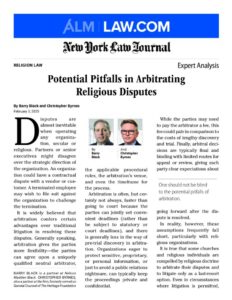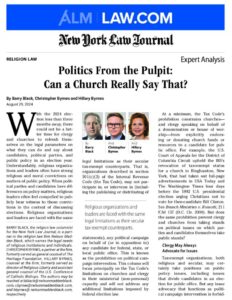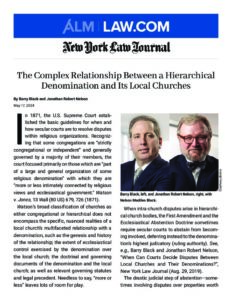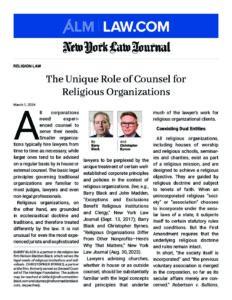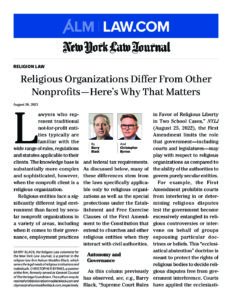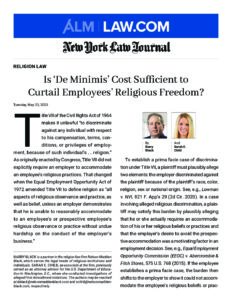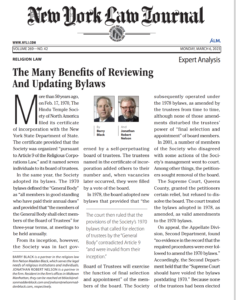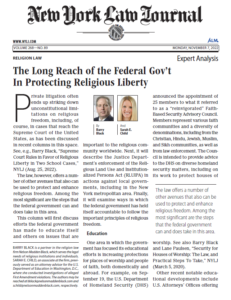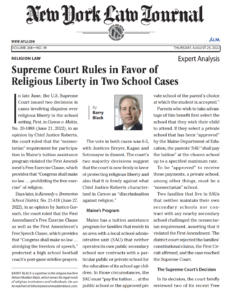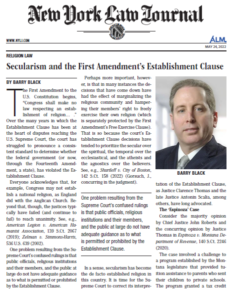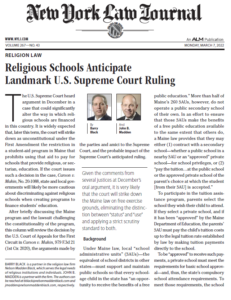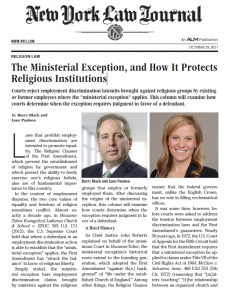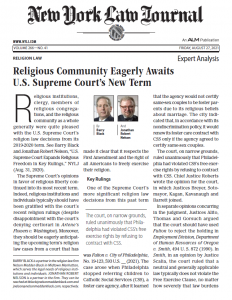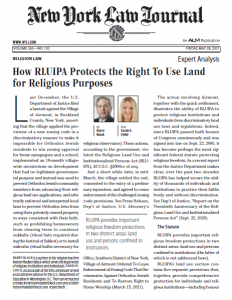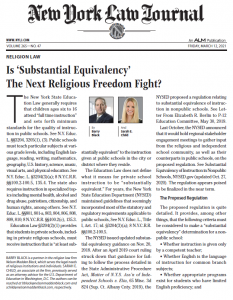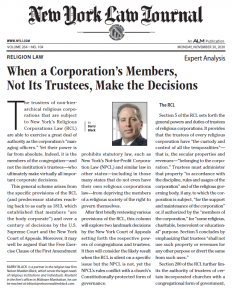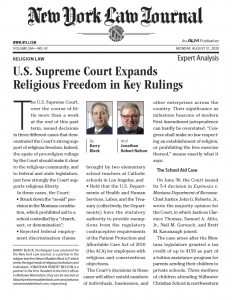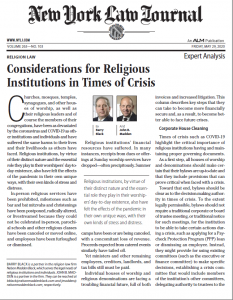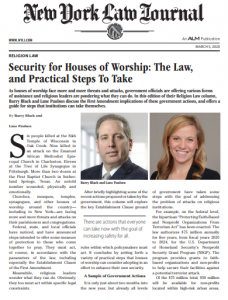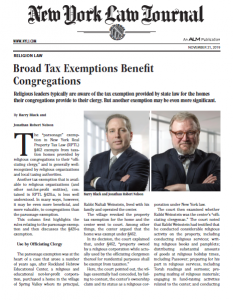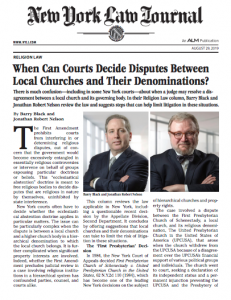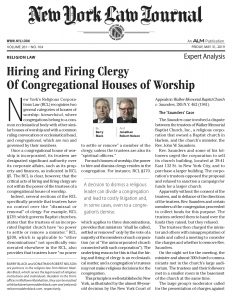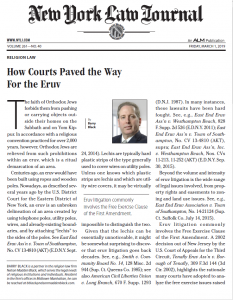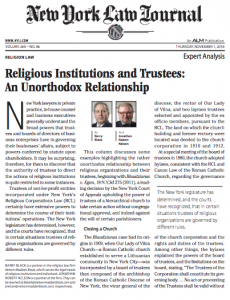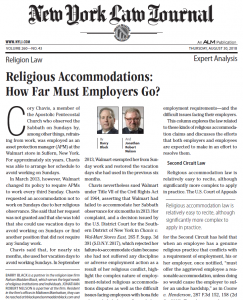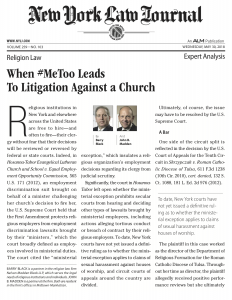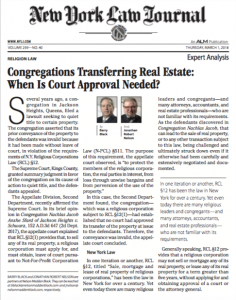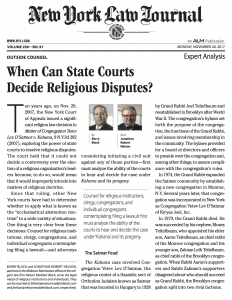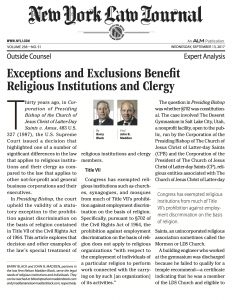Potential Pitfalls in Arbitrating Religious Disputes – February 2025
In the February 5, 2025 edition of the New York Law Journal, partners Barry Black and Christopher Byrnes explore the potential pitfalls of using arbitration to resolve religious disputes. Noting that while arbitration offers advantages like flexibility, cost-effectiveness, and privacy, it can be unpredictable and may not always be suitable for resolving disputes within religious organizations. The article also discusses the legal complexities surrounding religious disputes, including the ecclesiastical abstention doctrine, which limits the involvement of secular courts in such matters. The authors propose a hybrid approach that combines litigation and arbitration, offering a more balanced and secure way to resolve disputes within religious organizations.
Politics From the Pulpit: Can a Church Really Say That? – August 2024
In the August, 29 2024 edition of the New York Law Journal, partners Barry Black, Christopher Byrnes and Hillary Byrnes offer expert analysis on the legal boundaries that religious organizations and clergy must navigate during election years. With the 2024 election approaching, the importance for churches and clergy to understand the restrictions imposed by the IRS’s 501(c)(3) tax-exempt status, which prohibits political campaign intervention. This includes endorsing or opposing candidates or using church resources for political purposes.
The Complex Relationship Between a Hierarchical Denomination and Its Local Churches – May 2024
In the May 17, 2024 New York Law Journal Religion Law column, NMB partners Barry Black and Jonathan Nelson analyze the formation, nature and realities of church associations that have a hierarchical makeup by which local church affiliates are, in one way or another, subordinate to the ecclesiastical parent. How does this effect the local church’s temporal assets, such as its bank account and property? What is a secular court’s role in disputes over such assets? Disputes can often be avoided when the parameters of such relationships are spelled out clearly and understood by all parties.
The Unique Role of Counsel for Religious Organizations – March 2024
In the March 1, 2024 New York Law Journal Religion Law column, NMB partners Barry Black and Christopher Byrnes lay out the unique role of counsel–in house or outside–in representing religious organizations. The authors consider the lawyer’s role against the backdrop of the organization’s coexisting religious and corporate entities, which always inform the lawyer’s advice to the client. Whether in litigation or in transactional consultation, the lawyer must always be informed with regard to how differently the law treats religious organizations.
Religious Organizations Differ From Other Nonprofits—Here’s Why That Matters – August 2023
In the August 30, 2023 edition of the New York Law Journal Religion Law column, partners Barry Black and Christopher Byrnes examine the key differences in religious institutions vis-a-vis other nonprofit organizations and why that matters. In particular, the article dives into key structural and operational considerations ranging from autonomy and governance, employment and tax considerations.
Is ‘De Minimis’ Cost Sufficient to Curtail Employees’ Religious Freedom? – May 2023
In the May 23, 2023 New York Law Journal Religion Law column, co-authors Barry Black and Sarah Child examine laws, including the Civil Rights Act of 1964 and the Equal Employment Opportunity Act of 1972, and their interpretation in courts while analyzing the recent Groff v. DeJoy Supreme Court case, where the court expressed discomfort with the appropriateness of the “de minimis” standard. There will likely need further clarification around religious employees’ protection under precedent rulings.
The Many Benefits of Reviewing and Updating Bylaws – March 2023
In the March 6, 2023 edition of the New York Law Journal Religion Law column, partners Barry Black and Jonathan Robert Nelson discuss numerous benefits religious corporations can access through reviewing their bylaws and updating them to reflect current structure and operations.
The Long Reach of the Federal Gov’t In Protecting – November 2022
In the November 7, 2022 edition of the New York Law Journal Religion Law column, partner Barry Black and associate Sarah E. Child discuss various ways the federal government has taken action in regard to religious liberties in areas such as education, enforcement and government accountability.
Supreme Court Rules in Favor of Religious Liberty in Two School Cases – August 2022
In the August 25, 2022 edition of the New York Law Journal Religion Law column, partner Barry Black reviews two recent U.S. Supreme Court decisions involving disputes over religious liberty in the school setting, Carson v. Makin, No. 20-1088 (June 21, 2022), and Kennedy v. Bremerton School District, No. 21-418 (June 27,2022).
Secularism and the First Amendment’s Establishment Clause – May 2022
In the May 24, 2022 edition of the New York Law Journal Religion Law column, partner Barry Black examines the Establishment Clause of the First Amendment and examines how SCOTUS decisions have sided towards secularism. The column presents prior written opinions from SCOTUS justices then delves into a way forward towards an appropriate implementation and interpretation of the clause.
Religious Schools Anticipate Landmark U.S. Supreme Court Ruling – March 2022
In the March 7, 2022 edition of the New York Law Journal Religion Law column, partners Barry Black and John Madden take a look at a widely expected Supreme Court decision that would strike down as unconstitutional restriction in a student-aid program in Maine that prohibits using that aid to pay for schools that provide religious or sectarian education. They also review a prior U.S. Court of Appeals for the First Circuit decision and the likely impact of the Supreme Court ruling.
The Ministerial Exception, and How It Protects Religious Institutions – October 2021
In the October 29, 2021 edition of the New York Law Journal Religion Law column, partner Barry Black and counsel Lane Paulsen explored the ministerial exception and the inherent conflict that arises in employment disputes involving religious groups between equality and freedom of religion. The article touches on case law that prominently feature these types of issues and set precedent. Barry and Lane then examine how courts determine when the exception requires judgment in favor of a defendant.
Religious Community Eagerly Awaits U.S. Supreme Court’s New Term – August 2021
In the August 27, 2021 edition of the New York Law Journal Religion Law column, partners Barry Black and Jonathan Robert Nelson look back at recent key rulings from the Supreme Court and look ahead to the SCOTUS’s new term and upcoming religion law cases on the docket. A particular case of note, Carson v. Makin, No. 20-1088, challenging Maine law stating that since more than half of Maine’s school administrative units (SAUs) do not operate a public secondary school that the SAU may “pay the tuition … at the public school or the approved private school of the parent’s choice at which the student [from their SAU] is accepted.” However, under Maine law a private school must be “a nonsectarian school” and several families have claimed that this requirement infringes on several federal constitutional rights, including theirs rights under the Free Exercise Clause.
How RLUIPA Protects the Right To Use Land for Religious Purposes – May 2021
In the May 28, 2021 edition of the New York Law Journal Religion Law column, partner Barry Black and associate Sarah E. Child take a close look at the RLUIPA statute and how recent decisions have affected the interpretation and application of the act. Our lawyers focus in on the land use section that provides important religious freedom protections pertaining to houses of worship and religious schools—from zoning and landmarking laws that discriminate based on religion or that unjustifiably infringe on religious freedom.
Is ‘Substantial Equivalency’ The Next Religious Freedom Fight? – March 2021
Partner Barry Black and associate Sarah E. Child examine whether school requirements will be the next legal battle religious institutions will face as the New York State Education Department moves forward with the proposed regulation, Substantial Equivalency of Instruction in Nonpublic Schools, which broadly examines the criteria required for non-public schools to meet a “substantial equivalency” standard to their public school counterparts. Barry and Sarah review recent employment cases and how those precedents may translate and be interpreted when viewed through an education-focused lens.
When a Corporation’s Members, Not Its Trustees, Make the Decisions – November 2020
Partners Barry Black analyzes the duties, powers and limitations of “managing officers” of religious corporations operating under New York’s Religious Corporations Law (RCL) and how two landmark New York Court of Appeals decisions affect the interpretation of the RLC and the role of trustees when key decisions are made regarding the organization.
U.S. Supreme Court Expands Religious Freedom in Key Rulings – August 2020
Partners Barry Black and Jonathan Robert Nelson discuss three recent SCOTUS decisions that show strong support behind religious freedom. The analysis of these cases provide some clarity and guidance to all types of religious organizations on matters such as school aid, employment discrimination and contraceptives.
Considerations for Religious Institutions in Time of Crisis – May 2020
Partners Barry Black and John B. Madden dive into timely, distinct issues facing religious institutions during this uncertain time amidst the Covid-19 crisis and offer practical guidance and insight to stay ahead of growing concerns.
Security for Houses of Worship: The Law, and Practical Steps To Take – March 2020
In the March edition of the Religion Law column in the New York Law Journal, partner Barry Black and counsel Lane Paulsen discuss assistance for houses of worship from recent government regulations, the First Amendment implications of these government actions, and offer a guide for steps that institutions can take to protect themselves.
Broad Tax Exemptions Benefit Congregations – November 2019
In the November edition of their latest New York Law Journal Religion Law column, Barry Black and Jonathan Nelson discuss a tax exemption that may be a little lesser known than the parsonage allowance but might provide significant tax relief to qualifying congregations.
When Can Courts Decide Disputes Between Local Churches and Their Denominations? – August 2019
In their latest New York Law Journal Religion Law column, Barry Black and Jonathan Nelson tackle a subject that has led to decades of confusion in the legal system and woven a complex web of decisions to interpret: when can courts decide disputes between local churches and their denominations. Check out the full article as Barry and Jonathan review the law and suggest solutions to mitigate risk across the board.
Hiring and Firing Clergy Of Congregational Houses of Worship – May 2019
In the Friday, May 31, 2019 issue of the New York Law Journal, NMB partners Barry Black and Jonathan Nelson examine the differences of between hierarchical and congregational governing structures of religious institutions, and the understanding of the roles that trustees and congregations have authority over of hiring and firing affairs. Barry and Jonathan also outline practical considerations for congregations to be mindful of when making decisions about clergy.
How Courts Paved the Way For the Eruv – March 2019
Partner Barry Black authored an article for the New York Law Journal featured in their March 1st edition.
The article touched on the centuries-old practice of Orthodox Jews preventing them from pushing or carrying objects outside their homes on the Sabbath and on Yom Kippur, yet those prohibitions are lifted within an eruv, a ritual demarcation of an area.
Barry discusses recent and historical decisions on the practice and offers insight into how both sides of the community should approach the practice.
Religious Institutions and Trustees: An Unorthodox Relationship – November 2018
Religious Accommodations: How Far Must Employers Go? – August 2018
Religious accommodation disputes can lead to a variety of claims against employers. In their most recent Religion Law column for the New York Law Journal, Barry Black and Jonathan Nelson of the religion law firm Nelson Madden Black review and explain the law related to these kinds of religious accommodation claims and discuss the efforts that both employers and employees are expected to make in an effort to resolve them.
The bottom line, according to Mr. Black and Mr. Nelson, is that, in many instances, there is almost nothing more important to an employee than his or her religious beliefs. The law recognizes that, and requires that employers do so as well – within limits.
When #MeToo Leads To Litigation Against a Church – May 2018
Under the ministerial exception, a minister’s discrimination lawsuit against his or her congregation cannot be sustained as violative of the First Amendment. Does this principle apply to sexual harassment claims? What if the harassment claim in no way involves the hiring or firing of the minister? The courts are split on this question. How will NY’s courts decide the question? Read the New York Law Journal’s most recent Religion Law Column by partners Barry Black and John Madden.
Congregations Transferring Real Estate: When Is Court Approval Needed? – March 2018
Partners Barry Black and Jonathan Robert Nelson co-authored the New York Law Journal’s inaugural Religion Law column. The article focuses on the approval necessary prior to a religious institution’s transfer of real estate as set forth in New York’s Religious Corporations Law.
This was the first article in a new quarterly series for the New York Law Journal on Religion Law. Partner Barry Black has been designated by the NYLJ as its Religion Law Columnist.
Exceptions and Exclusions Benefit Religious Institutions and Clergy – September 2017
Barry Black and John B. Madden authored an “expert analysis” article for the New York Law Journal discussing several anomalies in which the law treats religious institutions and clergy uniquely, including certain tax exemptions, employment status of clergy and Title VII provisions.

